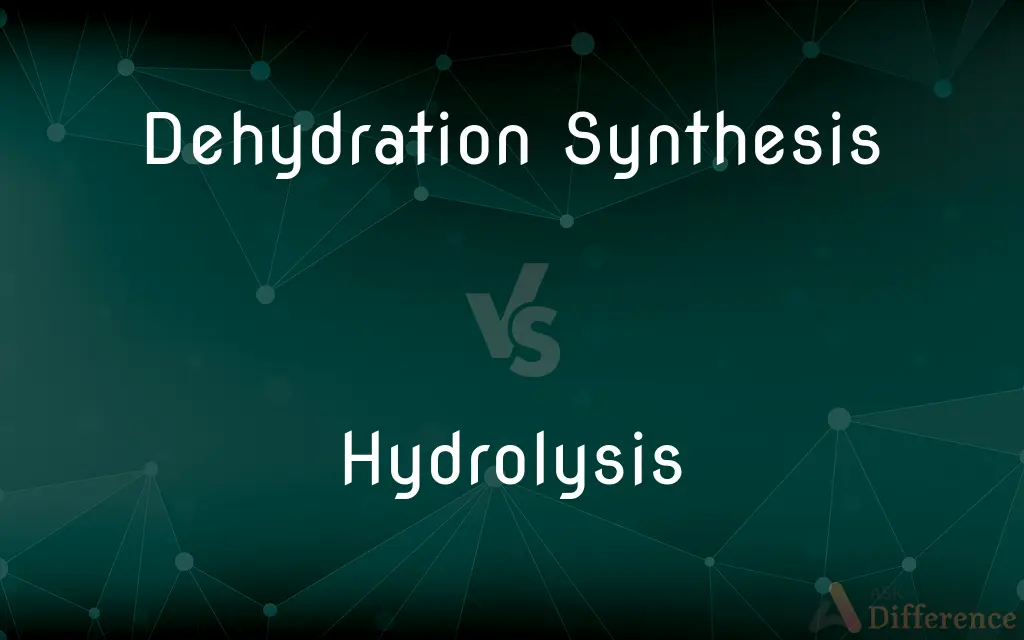Dehydration Synthesis vs. Hydrolysis — What's the Difference?
Edited by Tayyaba Rehman — By Fiza Rafique — Published on December 12, 2023
Dehydration synthesis combines molecules by removing water, while hydrolysis breaks molecules apart using water.

Difference Between Dehydration Synthesis and Hydrolysis
Table of Contents
ADVERTISEMENT
Key Differences
Dehydration synthesis is a process in which two molecules are joined together to form a larger molecule. This joining happens with the removal of a water molecule. For instance, in the formation of complex carbohydrates, monosaccharides are bonded together through dehydration synthesis, resulting in the release of a water molecule.
Hydrolysis, conversely, is the process of breaking down larger molecules into smaller ones by adding a water molecule. The word "hydrolysis" comes from "hydro-" meaning water and "-lysis" meaning to break apart. When a bond in a molecule is broken, a water molecule is added, with its hydrogen and hydroxide parts each joining one of the two smaller molecules.
In the realm of biology and chemistry, dehydration synthesis and hydrolysis play vital roles. Dehydration synthesis is essential for the growth and maintenance of cells, as it helps in the formation of new bonds. On the other hand, hydrolysis is key in digestion, as it helps break down complex molecules we consume into simpler ones that can be absorbed.
For a practical illustration, consider the formation and breakdown of polymers. Dehydration synthesis aids in the formation of polymers by joining monomers and releasing water. Hydrolysis, on the flip side, aids in the decomposition of polymers into monomers, utilizing water in the process.
Comparison Chart
Definition
Combines molecules by removing water.
Breaks molecules apart using water.
ADVERTISEMENT
Function in Biology
Essential for growth and cellular maintenance.
Crucial for digestion and nutrient absorption.
Result
Formation of a larger molecule.
Creation of smaller molecules.
Involvement of Water
Water is removed.
Water is added.
Example
Formation of dipeptides from amino acids.
Digestion of proteins into amino acids.
Compare with Definitions
Dehydration Synthesis
A process that joins molecules by eliminating water.
Amino acids connect to form proteins through dehydration synthesis.
Hydrolysis
A process that breaks molecules apart using water.
Lactose is broken down into glucose and galactose through hydrolysis.
Dehydration Synthesis
Chemical bonding of molecules with concurrent water expulsion.
Fatty acids and glycerol form lipids through dehydration synthesis.
Hydrolysis
A reaction splitting larger molecules by adding a water molecule.
Starches break down into simple sugars via hydrolysis.
Dehydration Synthesis
A reaction that forms larger molecules by removing a water molecule.
Monosaccharides combine to form disaccharides via dehydration synthesis.
Hydrolysis
Chemical decomposition using water.
Triglycerides are split into glycerol and fatty acids through hydrolysis.
Dehydration Synthesis
Formation of covalent bonds by eliminating water.
Polysaccharides are formed from simpler sugars using dehydration synthesis.
Hydrolysis
A way to degrade complex molecules with the aid of H2O.
Proteins are hydrolyzed into amino acids during digestion.
Dehydration Synthesis
A way to create complex molecules by extracting H2O.
Dipeptides are created from amino acids through dehydration synthesis.
Hydrolysis
Dissociation of bonds in a molecule using water.
A disaccharide becomes two monosaccharides when hydrolyzed.
Hydrolysis
The reaction of water with another chemical compound to form two or more products, involving ionization of the water molecule and usually splitting the other compound. Examples include the catalytic conversion of starch to glucose, saponification, and the formation of acids or bases from dissolved ions.
Hydrolysis
(chemistry) A chemical process of decomposition involving the splitting of a bond and the addition of the hydrogen cation and the hydroxide anion of water.
Hydrolysis
A chemical process causing the splitting of a chemical bond by the addition of the elements of water. Where the bond which is split is not part of a ring structure, this process causes formation of two compounds from one compound plus water, as in the hydrolysis of the ester bonds of fats during saponification.
Hydrolysis
A chemical reaction in which water reacts with a compound to produce other compounds; involves the splitting of a bond and the addition of the hydrogen cation and the hydroxide anion from the water
Common Curiosities
Can dehydration synthesis be reversed?
Yes, the process of hydrolysis can reverse the effects of dehydration synthesis by breaking down molecules.
How does hydrolysis differ from dehydration synthesis?
While dehydration synthesis removes water to join molecules, hydrolysis adds water to break them apart.
What's the main purpose of dehydration synthesis?
Dehydration synthesis joins smaller molecules to form larger ones by removing water.
Is water always removed in dehydration synthesis?
Yes, water is typically removed when two molecules are joined via dehydration synthesis.
Where is hydrolysis most commonly seen in our body?
In the digestive system, hydrolysis helps break down large nutrients into absorbable forms.
Is energy released during hydrolysis?
Often, yes. Hydrolysis reactions can release energy, especially in biological contexts.
What's a common example of dehydration synthesis?
The bonding of monosaccharides to form disaccharides, with water release, is a classic example.
Why is dehydration synthesis important in biology?
It's crucial for the growth, repair, and maintenance of cells by forming new molecular bonds.
Are both dehydration synthesis and hydrolysis specific to living organisms?
While most commonly discussed in biological contexts, these processes also occur in non-biological settings.
What role does hydrolysis play in digestion?
Hydrolysis breaks down complex molecules in food into simpler ones for absorption.
Is energy required for dehydration synthesis?
Yes, energy is typically needed to drive dehydration synthesis reactions.
Which one, dehydration synthesis or hydrolysis, is considered catabolic?
Hydrolysis is a catabolic process as it breaks down larger molecules, whereas dehydration synthesis is anabolic, building larger molecules.
Does hydrolysis always need water?
Yes, hydrolysis necessitates the addition of water to split molecules.
Can a molecule undergo both dehydration synthesis and hydrolysis?
Yes, many molecules, like carbohydrates and proteins, can be formed by dehydration synthesis and broken down by hydrolysis.
How is hydrolysis involved in daily life?
Soap-making, digestion of food, and certain chemical processes utilize hydrolysis.
Share Your Discovery

Previous Comparison
Wild Buffalo vs. Bison
Next Comparison
8 Bit Microcontroller vs. 16 Bit MicrocontrollerAuthor Spotlight
Written by
Fiza RafiqueFiza Rafique is a skilled content writer at AskDifference.com, where she meticulously refines and enhances written pieces. Drawing from her vast editorial expertise, Fiza ensures clarity, accuracy, and precision in every article. Passionate about language, she continually seeks to elevate the quality of content for readers worldwide.
Edited by
Tayyaba RehmanTayyaba Rehman is a distinguished writer, currently serving as a primary contributor to askdifference.com. As a researcher in semantics and etymology, Tayyaba's passion for the complexity of languages and their distinctions has found a perfect home on the platform. Tayyaba delves into the intricacies of language, distinguishing between commonly confused words and phrases, thereby providing clarity for readers worldwide.













































